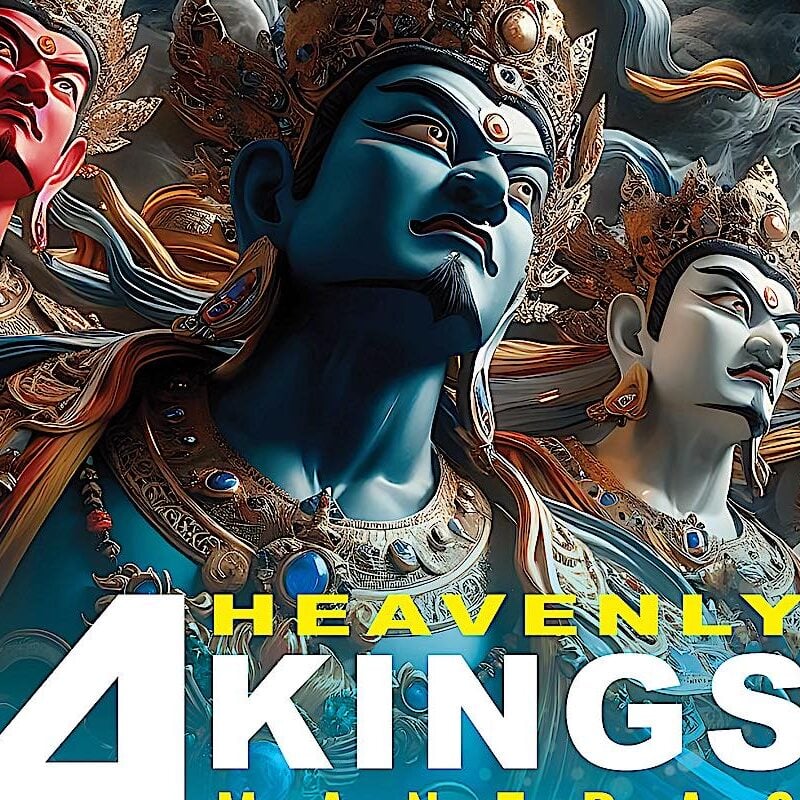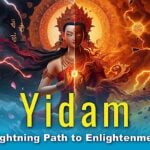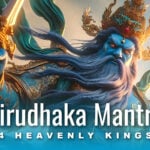Mantra Music: Heart Sutra Prajñāpāramitāhṛdaya in Sanskrit in Sanskrit For Recitation
Cultivating a daily practice of reciting the Heart Sutra, one of the paramount teachings in the Mahayana canon, has been extolled by Buddhist teachers as a pathway filled with profound transformative benefits. As a faithful Mahayana Buddhist, one reason you might incorporate the Heart Sutra into your daily ritual is its immense potential for fostering wisdom and compassion – qualities that lie at the heart of Buddhist practice.
Chant Daily for Wisdom, Compassion, Blessings (text below the player with Sanskrit in Bold):
Oṁ! Namo Bhagavatyai Ārya-Prajñā pāramitāyai!
Hail! Reverence to the Fortunate and Noble Perfection of Wisdom
Heart Sutra
Ārya-Avalokiteśvaro Bodhisattvo,
The Noble Buddha-to-be Avalokiteśvara,
gambhī rāṁ prajñā pāramitā caryāṁ caramāṇo,
while dwelling deep in the practice of the perfection of wisdom,
vyavalokayati sma panca-skandhā
beheld these five constituent groups (of mind and body)
tāṁś ca svabhā vaśūnyān paśyati sma.
and saw them empty of self-nature.
Iha, Śāriputra, rūpaṁ śūnyatā, śūnyata iva rūpaṁ;
Here, Śāriputra, form is emptiness, emptiness is surely form;
rūpān na pṛthak śūnyatā, śunyatāyā na pṛthag rūpaṁ;
emptiness is not different from form, form is not different from emptiness;
yad rūpaṁ, sā śūnyatā; ya śūnyatā, tad rūpaṁ;
whatever form there is, that is emptiness; whatever emptiness there is, that is form.
Evam eva vedanā-saṁjñā-saṁskāra-vijñā nāni
the same for feelings, perceptions, volitional processes and consciousness.
Iha, Śāriputra, sarva-dharmāḥ śūnyatā-lakṣaṇā,
Here, Śāriputra, all things have the characteristic of emptiness,
anut pannā, ani ruddhā; amalā, na vimalā; nūnā, na paripūrṇāḥ.
no arising, no ceasing; no purity, no impurity; no deficiency, no completeness.
Tasmāc Śāriputra, śūnyatā yāṁ
Therefore, Śāriputra, in emptiness
na rūpaṁ, na vedanā, na saṁjñā, na saṁskārāḥ, na vijñānami;
there is no form, no feeling, no perception, no volitional processes, no consciousness;
na cakṣuḥ-śrotra-ghrāna-jihvā-kāya-manāṁsi;
there are no eye, ear, nose, tongue, body or mind;
na rūpa-śabda-gandha-rasa-spraṣ ṭavya-dharmāḥ;
no forms, sounds, smells, tastes, touches, thoughts;
na cakṣūr-dhātur yāvan na mano vijñāna-dhātuḥ;
no eye-element (and so on) up to no mind-consciousness element;
na vidya, na avidyā, na avidyā-kṣayo, na avidyā-kṣayo, yāvan na jarā-maraṇam, na jarā-maraṇa-kṣayo;
no ignorance, no destruction of ignorance (and so on) up to no old age and death, no destruction of old age and death;
na duḥkha-samudaya-nirodha-mārgā;
no suffering, arising, cessation, path;
na jñānam, na prāptir aprāptivena.
no knowledge, no attainment, no non-attainment.
Bodhisattvasya
Therefore, Śāriputra, because of the Buddha-to-be’s non-attainments
Prajñā pāramitām āśritya, viharaty acittā varaṇaḥ,
he relies on the Perfection of Wisdom, and dwells with his mind unobstructed,
cittā varaṇa-nāstitvād atrasto,
having an unobstructed mind he does not tremble,
viparyāsa-atikrānto, niṣṭhā-Nirvāṇa.
overcoming opposition, he attains the state of Nirvāṇa.
Tryadhva-vyava sthitāḥ sarva-Buddhāḥ
All the Buddhas abiding in the three times
Prajñā pāramitām āśritya
through relying on the Perfection of Wisdom
anuttarāṁ Samyak sam bodhim abhisam buddhāḥ.
fully awaken to the unsurpassed Perfect and Complete Awakening.
Tasmāj jñāta vyo Prajñā pāramitā mahā-mantro,
Therefore one should know the Perfection of Wisdom is a great mantra,
mahā-vidyā mantro, ‘nuttara-mantro, samasama-mantraḥ,
a great scientific mantra, an unsurpassed mantra, an unmatched mantra,
sarva duḥkha praśa manaḥ, satyam, amithyatvāt.
the subduer of all suffering, the truth, not falsehood.
Prajñā pāramitā yām ukto mantraḥ tad-yathā:
In the Perfection of Wisdom the mantra has been uttered in this way:
gate, gate, pāragate, pārasaṁgate, Bodhi, svāhā!
gone, gone, gone beyond, gone completely beyond, Awakening, blessings!
Iti Prajñāpāramitā-Hṛdayam Samāptam
Thus the Heart of the Perfection of Wisdom is Complete
Opening praise:
ओṃ नमो भगवत्यै āर्यप्रज्ñāप्āरमित्āयै ओṃ नमो नमḥ सर्वज्ñāय
Sutra:
āर्यलोकितेśवरबोधिसत्त्वो गṃभ्īर्āय्āṃ प्रज्ñāप्āरमित्āय्āṃ कर्य्āṃ करमṇओ व्यवलोकयती स्म
पṃक स्कन्ध्āḥ
त्āṃस्का स्वभ्āवśūन्य्āन पśयती स्म
इहा śāरिपुत्र र्ūपṃ śūन्यत्ā śūन्यतैव र्ūपṃ र्ūप्āन्ना प्ṛथक्śūन्यत्ā śūन्यत्āय्ā न प्ṛथग्र्ūपṃ यद्र्ūपṃ स्ā śūन्यत्ā
य्ā śūन्यत्ā तद्र्ūपṃ
एवमेव वेदनसṃज्ñāसṃस्क्रविज्ñāन्āनि
इहा śāरिपुत्र सर्वधर्म्āḥ śūन्यत्āलक्ṣअṇā अनुत्पन्न्ā अनिरुद्ध्ā अ्अल्ā अविमला नोन्ā न परिप्ūर्ṇāḥ
तस्म्āक्च्āरिपुत्र śūन्यत्āय्āṃ न र्ūपṃ न वेदन्ā न सṃज्ñā न सṃस्क्āरो न विज्ñāन्āṃ ना कक्ṣउर न śरोत्रṃ न घ्र्āṇअṃ न जिह्व्ā न क्āयो न मनḥ
ना र्ūपṃ न śअब्दओ न गन्धो न रसो स्प्रṣṭअव्य न धर्म्āḥ
ना कक्ṣउर न ध्āतुर य्āवन्न मनो विज्ñāनध्āतुर्न विद्य्ā
न्āविद्य्ā न विद्य्āक्ṣāयो न्āविद्य्āक्ṣअयो य्āवन्न जर्āमरṇअṃ न जर्āमरṇअक्ṣअयो
न दुḥखो न समुदयो न निरोधो न म्āर्ग्ā न ज्ñāनṃ न प्र्āप्तिस्तस्म्āक्च्āरिपुत्र अप्र्āप्तित्व्āद् बोद्धिसत्त्व्āन्āṃ
प्रज्ñāप्āरमित्āम्āśरित्य विहरत्यकित्त्ā वरṇअḥ
कित्त्āवरṇअन्āस्तिव्āदत्रस्तो विपर्य्āस्āतिक्र्āन्तो निṣṭहनिर्व्āṇअḥ त्र्यध्वव्यवस्थित्āḥ सर्वबुद्ध्āḥग्
प्रज्ñāप्āरमित्āम्āśरित्य्āनुत्तर्āṃ सम्यक्सṃबोधिमभिसṃबुद्ध्āḥ
तस्म्āज्ज्ñāतव्यṃ प्रज्ñāप्āरमित्āमह्āमन्त्रो मह्āविद्य्āमम्त्रो नुत्त्तरमन्त्रो समसममन्त्र सर्वदुḥखप्रśअ्अनḥ सत्यममिथ्यत्व्ā प्रज्ñāप्āरमित्āय्āमुक्तो मन्त्रḥ तद्यथ्ā
गते गते परगते परसम्घते बोधी स्वहा
Did you Know?
• Shunyata or “Emptiness” is NOT nothingness. Per Thich Nhat Hanh: Emptiness means empty of self — but in the fullness
of everything else… it is because of emptiness everything is possible.” (Source)
• Emptiness is the best single-word translation of Shunyata, or Oneness. Voidness and Nothingness are INCORRECT translations (or incomplete). Even in psychology, there is a profound difference between feeling “nothing” and feeling “empty.” Emptiness can be filled.
Credits:
SANSKRIT IN DEVANAGARI from MIT.EDU.
English Translation edited by Edward Conze, translation to English by Anadajoti Bhikku
More Information on Buddha Weekly
• Feature on “Recitation of Heart Sutra” and its benefits https:// buddhaweekly.com/heart-sutra-recitation/
• Commentary on Heart Sutra by Jason Espada https:// buddhaweekly.com/?p=15177
More articles by this author

NEW MUSIC ALBUM! Four Heavenly Kings: Mantras Chanted in Sanskrit for Good Fortune, Protection, Harmony and Wisdom

Mantra Music: Buddha Weekly’s Mantra Collection 1: Green Tara, Avalokiteshvara, Manjushri, Vajrapani, Vajrasattva and more!
Search
Latest Features
Please support the "Spread the Dharma" mission as one of our heroic Dharma Supporting Members, or with a one-time donation.
Please Help Support the “Spread the Dharma” Mission!

Be a part of the noble mission as a supporting member or a patron, or a volunteer contributor of content.
The power of Dharma to help sentient beings, in part, lies in ensuring access to Buddha’s precious Dharma — the mission of Buddha Weekly. We can’t do it without you!
A non-profit association since 2007, Buddha Weekly published many feature articles, videos, and, podcasts. Please consider supporting the mission to preserve and “Spread the Dharma." Your support as either a patron or a supporting member helps defray the high costs of producing quality Dharma content. Thank you! Learn more here, or become one of our super karma heroes on Patreon.
Lee Kane
Author | Buddha Weekly
Lee Kane is the editor of Buddha Weekly, since 2007. His main focuses as a writer are mindfulness techniques, meditation, Dharma and Sutra commentaries, Buddhist practices, international perspectives and traditions, Vajrayana, Mahayana, Zen. He also covers various events.
Lee also contributes as a writer to various other online magazines and blogs.
















